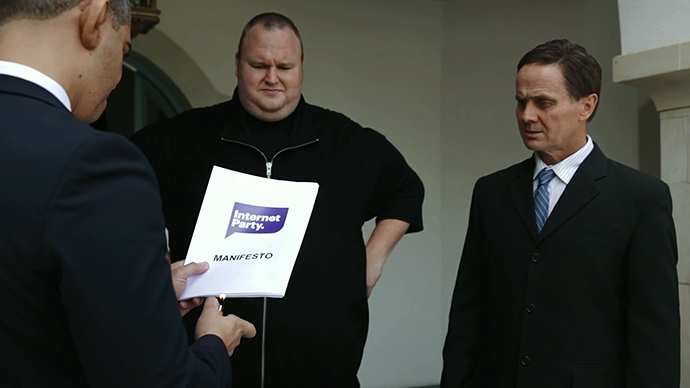Kim Dotcom’s new IP address…Internet Party, that is

Kim Dotcom has long made waves in cyberspace, and is now ready to make a splash in politics. The MegaUpload mogul and alleged internet pirate has launched his own political party just in time to contest New Zealand’s general election in September.
First announced in January, Dotcom’s Internet Party promises free high-speed internet, a high-tech job boom, restricted government surveillance and a review of the Trans-Pacific Partnership Agreement as part of its political platform.
"It is a movement for people who haven't voted before, who have been disappointed by voting, or who don't like the political choices on offer," Dotcom said in a statement.
"It is a movement for people who care about a digital future, and who want a society that is open, free and fair."
Exciting day for us!!! pic.twitter.com/RYOVsYlFWo
— Kim Dotcom (@KimDotcom) March 27, 2014
In a YouTube video entitled Project Manifesto, the Internet Party does a somewhat bizarre sendup of a meeting between New Zealand Prime Minster John Key and US President Barack Obama. In the clip, an Obama lookalike calls upon a blustering and dimwitted Key impersonator to destroy the Internet Party’s manifesto, believed to be stashed away in hardcopy in the internet tycoon’s home. But when the pair show up on Dotcom’s doorstep, he greets them at the door, telling them Edward Snowden had tipped him off.
Kim manages to win over Obama over with his revolutionary platform, though “Obama’s boss” calls to tell the commander in chief to destroy the document anyways. In the end, Obama defies his puppeteer on the condition that Kim “makes it happen.”
To enter parliament, the Internet Party would have to clinch an electoral seat or cross the 5 percent electoral threshold to find representation in the 120-member body.
Dotcom, a German citizen who also goes by the name of Kim Shmitz, does not actually have the right to stand for election in New Zealand until he becomes a citizen. To even have a shot at taking part in the election, the party must now sign up 500 members and register with electoral authorities.
On Thursday, Dotcom told web news portal Stuff.co.nz that a sitting electorate MP would join the party, though he would not clarify who the deputy in question was.
Party chief executive Vikram Kumar told the site there are three more sitting parliamentarians who have expressed interest in joining the party.
Other candidates would be chosen in a process that was "almost like an audition," he said.
Kim, who said the party wants to attract “young, new talent" to the country's leadership, said once members signed up to the party, they would have the option of expressing their interest in running for office.
Dotcom said the Internet Party was open to working with any other party other than Key’s center-right New Zealand National Party.
If we keep getting new member registrations at the current rate we'll have more members than the National Party in a few days :) #Technology
— Kim Dotcom (@KimDotcom) March 27, 2014
Dotcom’s political fortunes, however, could be stymied as a result of a longstanding legal battle with US authorities, who are attempting to extradite him to face charges of online piracy, money laundering and racketeering over Megaupload, which is now closed.
Under orders from the FBI, the New Zealand government arrested Dotcom in 2012 at his mansion near Auckland. Dotcom was freed on bail but his movements have been restricted.
The internet tycoon and three of his colleagues have been battling US and New Zealand authorities ever since; an extradition hearing is scheduled for July.
US authorities allege that Megaupload cost film studios and record companies more than $500 million and generated more than $175 million by encouraging paying users to share and store copyrighted material like movies and TV shows.
Dotcom claims Megaupload was merely an online warehouse and should not be accountable if the content in it was obtained illegally.
Whether Kim ever manages to run for office remains to be seen, though he already has one major political victory over Key. In September 2012, the New Zealand PM was forced to apologize to Kim after it was discovered that Government Communications Security Bureau (GCSB) was illegally spying on Dotcom prior to the police raid on his home.














